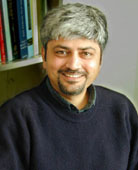Postdoctoral scholars, or postdocs, play a critical role in every research institution.
 |
Iqbal Ahmad, Ph.D. |
On Monday, Sept. 11, the Office of Postdoctoral Education will hold its first-ever postdoctoral education seminar. The event, which is open to postdocs, faculty and graduate students, will be held from 9 a.m. to 1 p.m. in the Durham Research Center Auditorium.
Dr. Ahmad and David Crouse, Ph.D., associate vice chancellor and executive associate dean for graduate studies, will speak at the seminar along with two national experts on postdoctoral education – Philip Clifford, Ph.D., associate dean for postdoctoral education at Medical College of Wisconsin, and Tung-Tien (Henry) Sun, Ph.D., professor of dermatology, pharmacology and urology at New York University Medical Center. Dr. Clifford’s talk is titled, “Extreme Makeover: Postdoc Edition.” Dr. Sun’s talk is titled, “Scientific Attitude and Student-Mentor Relationship.”
“We’re excited to hold this first seminar on postdoctoral education,” Dr. Ahmad said. “It will provide some important insights on how we can maximize the postdoc experience at UNMC. Our goal is to create an environment and culture at UNMC that is conducive for excellent, effective and satisfactory mentoring and training of postdocs to allow them to make a timely transition to an independent career.”
Postdocs are the fastest growing population on the UNMC campus. The number of postdocs at UNMC has increased nearly eightfold in the past decade, going from 20 in 1995 to 156 in 2005.
“Postdocs have always fallen outside the line,” Dr. Crouse said. “They are not students. They are not faculty. And, many times, they aren’t even considered employees. By creating the Office of Postdoctoral Education, we want to give them a voice in the university.”
Dr. Crouse stressed that postdocs are vital to the research enterprise. “They are the grease that makes the research engine go,” he said. “We want to do everything we can to make their lives better. We want to help them find their way in science.
“Postdocs and graduate students perform the key laboratory work. I guarantee you it’s usually not the full professors who are injecting mice and changing culture media at 10 o’clock on Saturday night – it’s the postdoc or graduate student.”
The postdocs at UNMC can be found in the basic science areas where research is conducted. All have finished their doctoral work and are seeking additional research training before they begin their full-time careers. They spend between two and four years in their postdoctoral training.
“Postdocs are very similar to resident physicians in medicine,” Dr. Crouse said. “It’s a bridge to a full-time faculty, government or industrial career.”
For more information on Monday’s postdoctoral education seminar, call Dr. Ahmad at 559-4091.